La Trobe University NSG2ANB: Case Study A - Hospitalization Impacts
VerifiedAdded on 2022/10/09
|8
|1789
|444
Case Study
AI Summary
This case study, focusing on Wendy Xu, a patient with stage 3 brain cancer, explores the multifaceted impacts of hospitalization. It details the challenges faced during hospitalization, including confusion, malnutrition, and restricted movements, alongside potential interventions such as interdisciplinary team involvement, particularly neurologists and neuro-oncologists, to address these issues and reduce rehospitalization rates. The study further examines the post-hospital syndrome, highlighting stressors like sleep disruption and malnutrition, and their effects on patients and families. It emphasizes the importance of reducing hospital-related stressors and promoting patient well-being through interventions such as Hospital at Home programs and the use of tools to measure hospital-related stress. The analysis concludes by advocating for focused efforts to reduce patient sensitivity to hospital-related stressors to mitigate the negative outcomes associated with post-hospital syndrome, thereby improving the overall patient experience and outcomes.
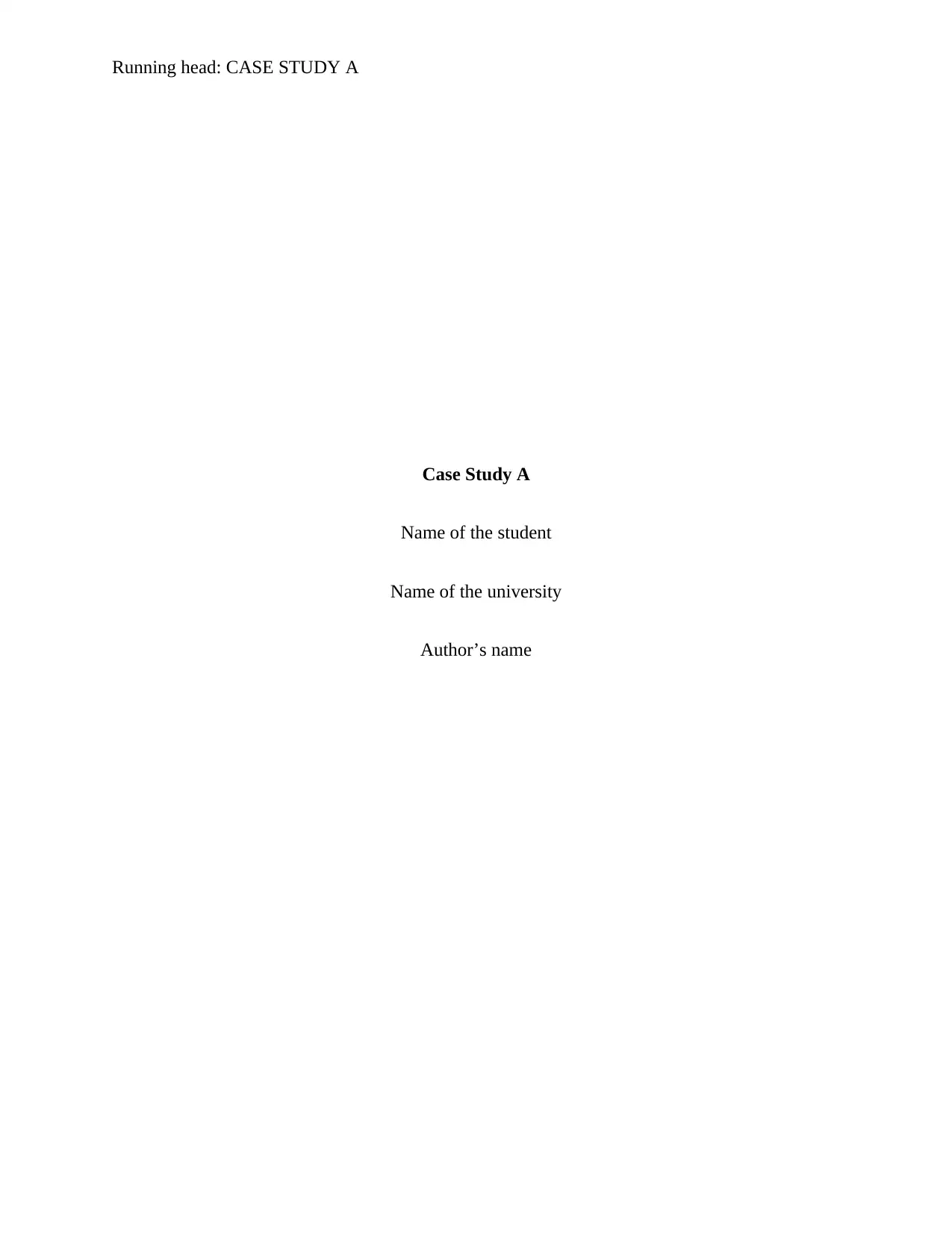
Running head: CASE STUDY A
Case Study A
Name of the student
Name of the university
Author’s name
Case Study A
Name of the student
Name of the university
Author’s name
Paraphrase This Document
Need a fresh take? Get an instant paraphrase of this document with our AI Paraphraser

1CASE STUDY A
During Hospitalization
1. The idea that a person has to go to a hospital is generally understood as indicating that he
will be safe from the usual stress and stress of ordinary life and therefore comfortable and
safe in a location of shelter and safety. Most non-dependent older people diagnosed
owing to heart disease (such as Coronary Artery Disease which Wendy was having)
demonstrate a fragile release phenotype that gives enhanced danger of death and
readmission regardless of age, co-morbidity, and standard HF prognostic variables. In
addition, its effect is quantitatively measured as' dose-dependent.' Frailty also raises the
premature danger of fresh disability and the need for fresh personal assistance in
fundamental day-to-day operations (Vidán et al., 2016). During the hospitalization
Wendy might have faced various kinds of difficulties such as malnutrition, stress,
nervousness because of continuous changing environmental surroundings. There were
also certain other problems such as confusion and decline in mental function because
Wendy was having brain cancer stage 3, incontinence, inability to urinate because of old
age, restricted movements, lack of sleep. Sometimes this contributes to another issue.
Some individuals who are confused, distressed, or malnourished, or elderly, are often less
able to take care of themselves when hospitalized. People who are unable to take
adequate charge of themselves are more probable to have extended hospital visits and
will eventually be sent to a nursing home after release. If issues are anticipated by the
individual or household groups, they should address that with the nursing staff to create
preventive interventions. Just like Wendy used to get confused, her family members
should inform the staff participants so that they can assist her with the issue.
During Hospitalization
1. The idea that a person has to go to a hospital is generally understood as indicating that he
will be safe from the usual stress and stress of ordinary life and therefore comfortable and
safe in a location of shelter and safety. Most non-dependent older people diagnosed
owing to heart disease (such as Coronary Artery Disease which Wendy was having)
demonstrate a fragile release phenotype that gives enhanced danger of death and
readmission regardless of age, co-morbidity, and standard HF prognostic variables. In
addition, its effect is quantitatively measured as' dose-dependent.' Frailty also raises the
premature danger of fresh disability and the need for fresh personal assistance in
fundamental day-to-day operations (Vidán et al., 2016). During the hospitalization
Wendy might have faced various kinds of difficulties such as malnutrition, stress,
nervousness because of continuous changing environmental surroundings. There were
also certain other problems such as confusion and decline in mental function because
Wendy was having brain cancer stage 3, incontinence, inability to urinate because of old
age, restricted movements, lack of sleep. Sometimes this contributes to another issue.
Some individuals who are confused, distressed, or malnourished, or elderly, are often less
able to take care of themselves when hospitalized. People who are unable to take
adequate charge of themselves are more probable to have extended hospital visits and
will eventually be sent to a nursing home after release. If issues are anticipated by the
individual or household groups, they should address that with the nursing staff to create
preventive interventions. Just like Wendy used to get confused, her family members
should inform the staff participants so that they can assist her with the issue.
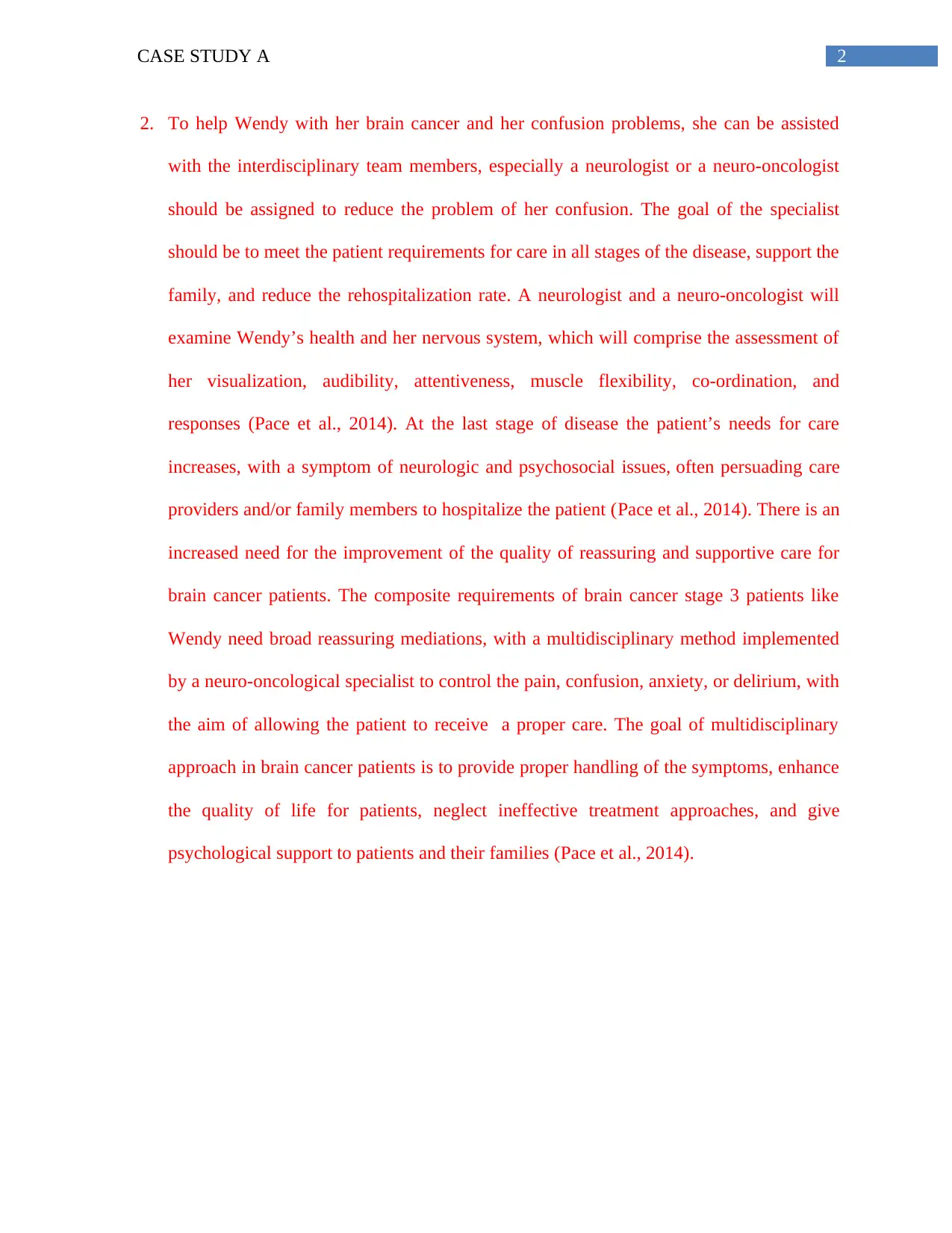
2CASE STUDY A
2. To help Wendy with her brain cancer and her confusion problems, she can be assisted
with the interdisciplinary team members, especially a neurologist or a neuro-oncologist
should be assigned to reduce the problem of her confusion. The goal of the specialist
should be to meet the patient requirements for care in all stages of the disease, support the
family, and reduce the rehospitalization rate. A neurologist and a neuro-oncologist will
examine Wendy’s health and her nervous system, which will comprise the assessment of
her visualization, audibility, attentiveness, muscle flexibility, co-ordination, and
responses (Pace et al., 2014). At the last stage of disease the patient’s needs for care
increases, with a symptom of neurologic and psychosocial issues, often persuading care
providers and/or family members to hospitalize the patient (Pace et al., 2014). There is an
increased need for the improvement of the quality of reassuring and supportive care for
brain cancer patients. The composite requirements of brain cancer stage 3 patients like
Wendy need broad reassuring mediations, with a multidisciplinary method implemented
by a neuro-oncological specialist to control the pain, confusion, anxiety, or delirium, with
the aim of allowing the patient to receive a proper care. The goal of multidisciplinary
approach in brain cancer patients is to provide proper handling of the symptoms, enhance
the quality of life for patients, neglect ineffective treatment approaches, and give
psychological support to patients and their families (Pace et al., 2014).
2. To help Wendy with her brain cancer and her confusion problems, she can be assisted
with the interdisciplinary team members, especially a neurologist or a neuro-oncologist
should be assigned to reduce the problem of her confusion. The goal of the specialist
should be to meet the patient requirements for care in all stages of the disease, support the
family, and reduce the rehospitalization rate. A neurologist and a neuro-oncologist will
examine Wendy’s health and her nervous system, which will comprise the assessment of
her visualization, audibility, attentiveness, muscle flexibility, co-ordination, and
responses (Pace et al., 2014). At the last stage of disease the patient’s needs for care
increases, with a symptom of neurologic and psychosocial issues, often persuading care
providers and/or family members to hospitalize the patient (Pace et al., 2014). There is an
increased need for the improvement of the quality of reassuring and supportive care for
brain cancer patients. The composite requirements of brain cancer stage 3 patients like
Wendy need broad reassuring mediations, with a multidisciplinary method implemented
by a neuro-oncological specialist to control the pain, confusion, anxiety, or delirium, with
the aim of allowing the patient to receive a proper care. The goal of multidisciplinary
approach in brain cancer patients is to provide proper handling of the symptoms, enhance
the quality of life for patients, neglect ineffective treatment approaches, and give
psychological support to patients and their families (Pace et al., 2014).
⊘ This is a preview!⊘
Do you want full access?
Subscribe today to unlock all pages.

Trusted by 1+ million students worldwide
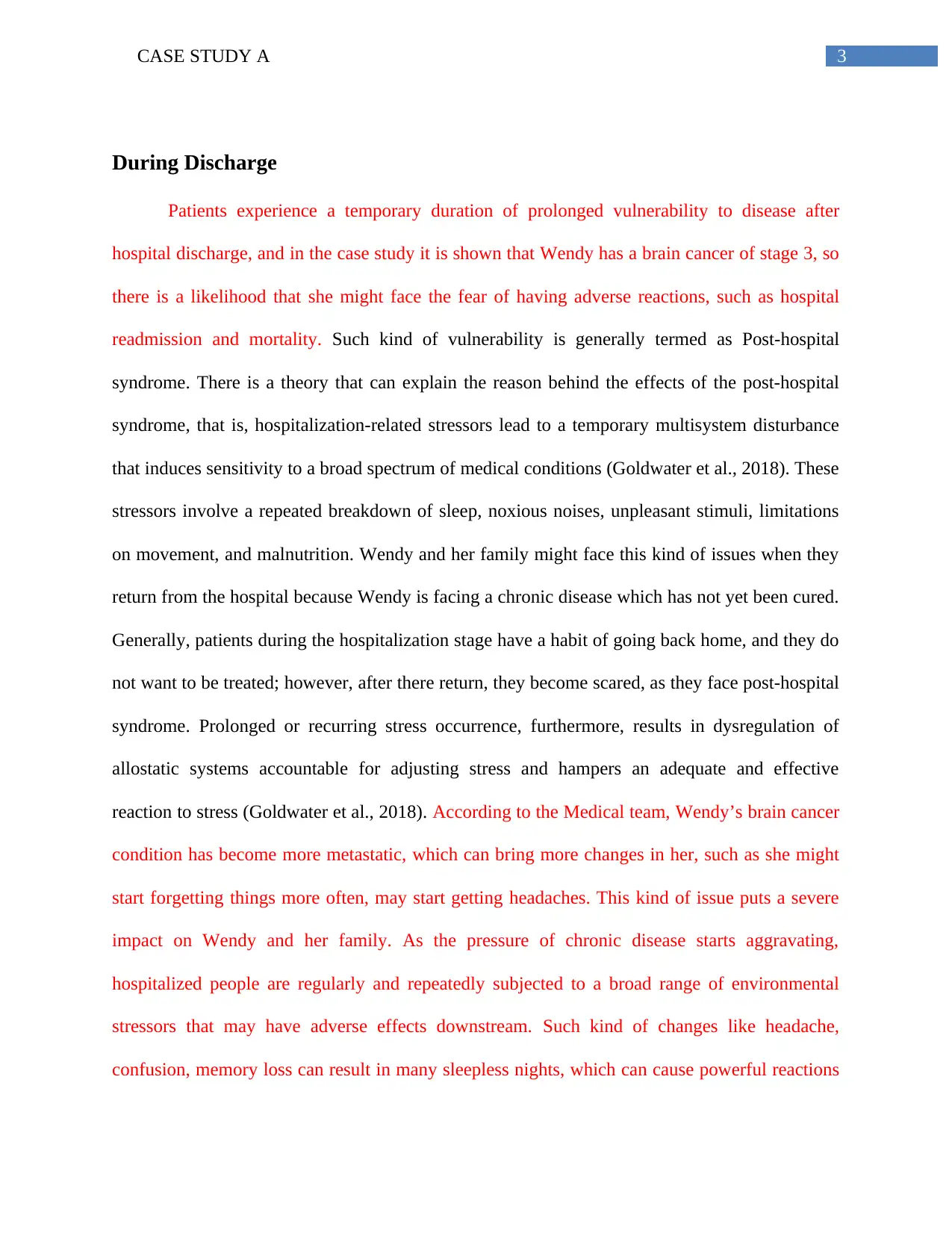
3CASE STUDY A
During Discharge
Patients experience a temporary duration of prolonged vulnerability to disease after
hospital discharge, and in the case study it is shown that Wendy has a brain cancer of stage 3, so
there is a likelihood that she might face the fear of having adverse reactions, such as hospital
readmission and mortality. Such kind of vulnerability is generally termed as Post-hospital
syndrome. There is a theory that can explain the reason behind the effects of the post-hospital
syndrome, that is, hospitalization-related stressors lead to a temporary multisystem disturbance
that induces sensitivity to a broad spectrum of medical conditions (Goldwater et al., 2018). These
stressors involve a repeated breakdown of sleep, noxious noises, unpleasant stimuli, limitations
on movement, and malnutrition. Wendy and her family might face this kind of issues when they
return from the hospital because Wendy is facing a chronic disease which has not yet been cured.
Generally, patients during the hospitalization stage have a habit of going back home, and they do
not want to be treated; however, after there return, they become scared, as they face post-hospital
syndrome. Prolonged or recurring stress occurrence, furthermore, results in dysregulation of
allostatic systems accountable for adjusting stress and hampers an adequate and effective
reaction to stress (Goldwater et al., 2018). According to the Medical team, Wendy’s brain cancer
condition has become more metastatic, which can bring more changes in her, such as she might
start forgetting things more often, may start getting headaches. This kind of issue puts a severe
impact on Wendy and her family. As the pressure of chronic disease starts aggravating,
hospitalized people are regularly and repeatedly subjected to a broad range of environmental
stressors that may have adverse effects downstream. Such kind of changes like headache,
confusion, memory loss can result in many sleepless nights, which can cause powerful reactions
During Discharge
Patients experience a temporary duration of prolonged vulnerability to disease after
hospital discharge, and in the case study it is shown that Wendy has a brain cancer of stage 3, so
there is a likelihood that she might face the fear of having adverse reactions, such as hospital
readmission and mortality. Such kind of vulnerability is generally termed as Post-hospital
syndrome. There is a theory that can explain the reason behind the effects of the post-hospital
syndrome, that is, hospitalization-related stressors lead to a temporary multisystem disturbance
that induces sensitivity to a broad spectrum of medical conditions (Goldwater et al., 2018). These
stressors involve a repeated breakdown of sleep, noxious noises, unpleasant stimuli, limitations
on movement, and malnutrition. Wendy and her family might face this kind of issues when they
return from the hospital because Wendy is facing a chronic disease which has not yet been cured.
Generally, patients during the hospitalization stage have a habit of going back home, and they do
not want to be treated; however, after there return, they become scared, as they face post-hospital
syndrome. Prolonged or recurring stress occurrence, furthermore, results in dysregulation of
allostatic systems accountable for adjusting stress and hampers an adequate and effective
reaction to stress (Goldwater et al., 2018). According to the Medical team, Wendy’s brain cancer
condition has become more metastatic, which can bring more changes in her, such as she might
start forgetting things more often, may start getting headaches. This kind of issue puts a severe
impact on Wendy and her family. As the pressure of chronic disease starts aggravating,
hospitalized people are regularly and repeatedly subjected to a broad range of environmental
stressors that may have adverse effects downstream. Such kind of changes like headache,
confusion, memory loss can result in many sleepless nights, which can cause powerful reactions
Paraphrase This Document
Need a fresh take? Get an instant paraphrase of this document with our AI Paraphraser
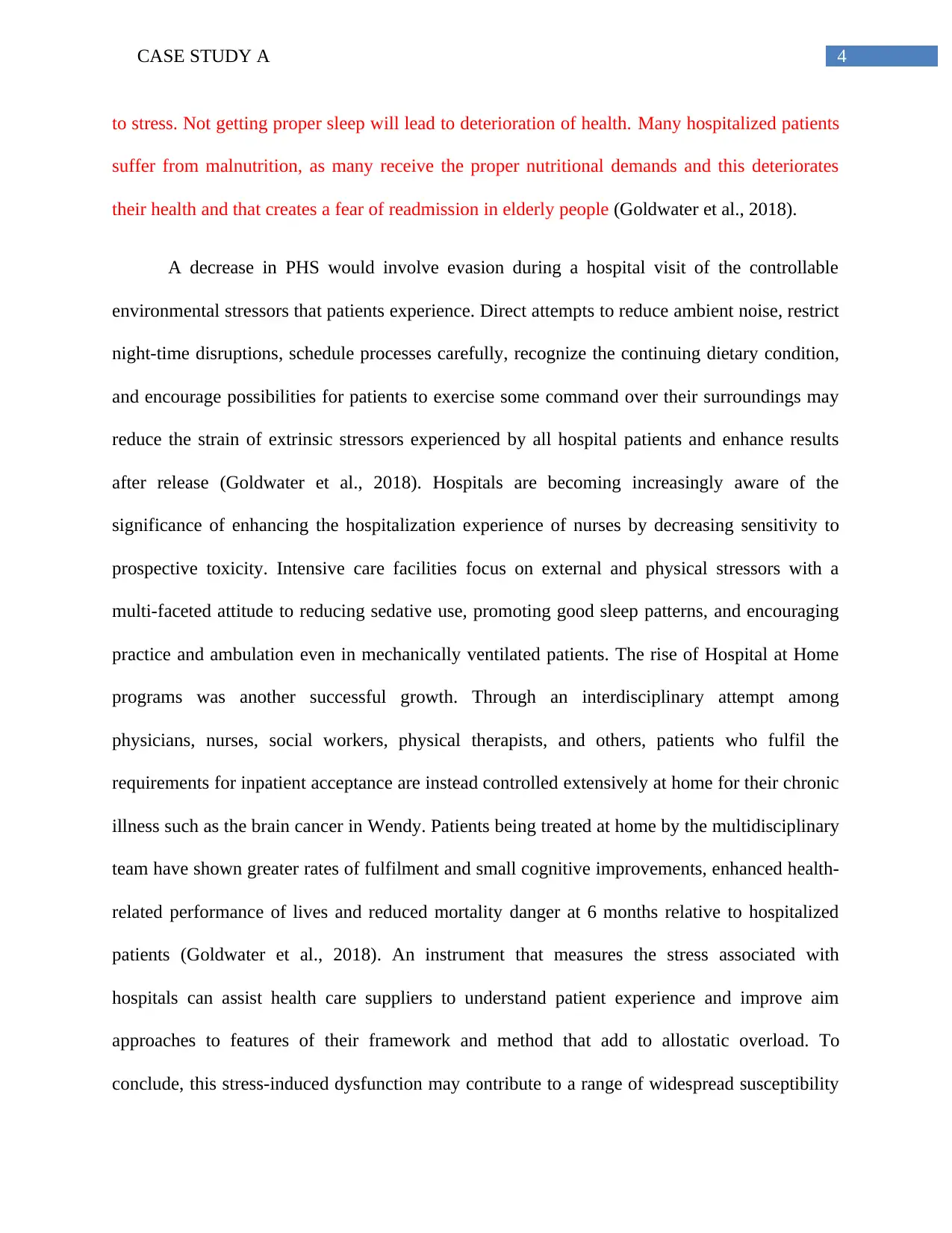
4CASE STUDY A
to stress. Not getting proper sleep will lead to deterioration of health. Many hospitalized patients
suffer from malnutrition, as many receive the proper nutritional demands and this deteriorates
their health and that creates a fear of readmission in elderly people (Goldwater et al., 2018).
A decrease in PHS would involve evasion during a hospital visit of the controllable
environmental stressors that patients experience. Direct attempts to reduce ambient noise, restrict
night-time disruptions, schedule processes carefully, recognize the continuing dietary condition,
and encourage possibilities for patients to exercise some command over their surroundings may
reduce the strain of extrinsic stressors experienced by all hospital patients and enhance results
after release (Goldwater et al., 2018). Hospitals are becoming increasingly aware of the
significance of enhancing the hospitalization experience of nurses by decreasing sensitivity to
prospective toxicity. Intensive care facilities focus on external and physical stressors with a
multi-faceted attitude to reducing sedative use, promoting good sleep patterns, and encouraging
practice and ambulation even in mechanically ventilated patients. The rise of Hospital at Home
programs was another successful growth. Through an interdisciplinary attempt among
physicians, nurses, social workers, physical therapists, and others, patients who fulfil the
requirements for inpatient acceptance are instead controlled extensively at home for their chronic
illness such as the brain cancer in Wendy. Patients being treated at home by the multidisciplinary
team have shown greater rates of fulfilment and small cognitive improvements, enhanced health-
related performance of lives and reduced mortality danger at 6 months relative to hospitalized
patients (Goldwater et al., 2018). An instrument that measures the stress associated with
hospitals can assist health care suppliers to understand patient experience and improve aim
approaches to features of their framework and method that add to allostatic overload. To
conclude, this stress-induced dysfunction may contribute to a range of widespread susceptibility
to stress. Not getting proper sleep will lead to deterioration of health. Many hospitalized patients
suffer from malnutrition, as many receive the proper nutritional demands and this deteriorates
their health and that creates a fear of readmission in elderly people (Goldwater et al., 2018).
A decrease in PHS would involve evasion during a hospital visit of the controllable
environmental stressors that patients experience. Direct attempts to reduce ambient noise, restrict
night-time disruptions, schedule processes carefully, recognize the continuing dietary condition,
and encourage possibilities for patients to exercise some command over their surroundings may
reduce the strain of extrinsic stressors experienced by all hospital patients and enhance results
after release (Goldwater et al., 2018). Hospitals are becoming increasingly aware of the
significance of enhancing the hospitalization experience of nurses by decreasing sensitivity to
prospective toxicity. Intensive care facilities focus on external and physical stressors with a
multi-faceted attitude to reducing sedative use, promoting good sleep patterns, and encouraging
practice and ambulation even in mechanically ventilated patients. The rise of Hospital at Home
programs was another successful growth. Through an interdisciplinary attempt among
physicians, nurses, social workers, physical therapists, and others, patients who fulfil the
requirements for inpatient acceptance are instead controlled extensively at home for their chronic
illness such as the brain cancer in Wendy. Patients being treated at home by the multidisciplinary
team have shown greater rates of fulfilment and small cognitive improvements, enhanced health-
related performance of lives and reduced mortality danger at 6 months relative to hospitalized
patients (Goldwater et al., 2018). An instrument that measures the stress associated with
hospitals can assist health care suppliers to understand patient experience and improve aim
approaches to features of their framework and method that add to allostatic overload. To
conclude, this stress-induced dysfunction may contribute to a range of widespread susceptibility

5CASE STUDY A
to disease and the possibility of negative results after discharge from the hospital. Focused
attempts to decrease patient sensitivity to hospital-related stressors may decrease the existence or
seriousness of PHS during and after hospitalization (Goldwater et al., 2018).
to disease and the possibility of negative results after discharge from the hospital. Focused
attempts to decrease patient sensitivity to hospital-related stressors may decrease the existence or
seriousness of PHS during and after hospitalization (Goldwater et al., 2018).
⊘ This is a preview!⊘
Do you want full access?
Subscribe today to unlock all pages.

Trusted by 1+ million students worldwide
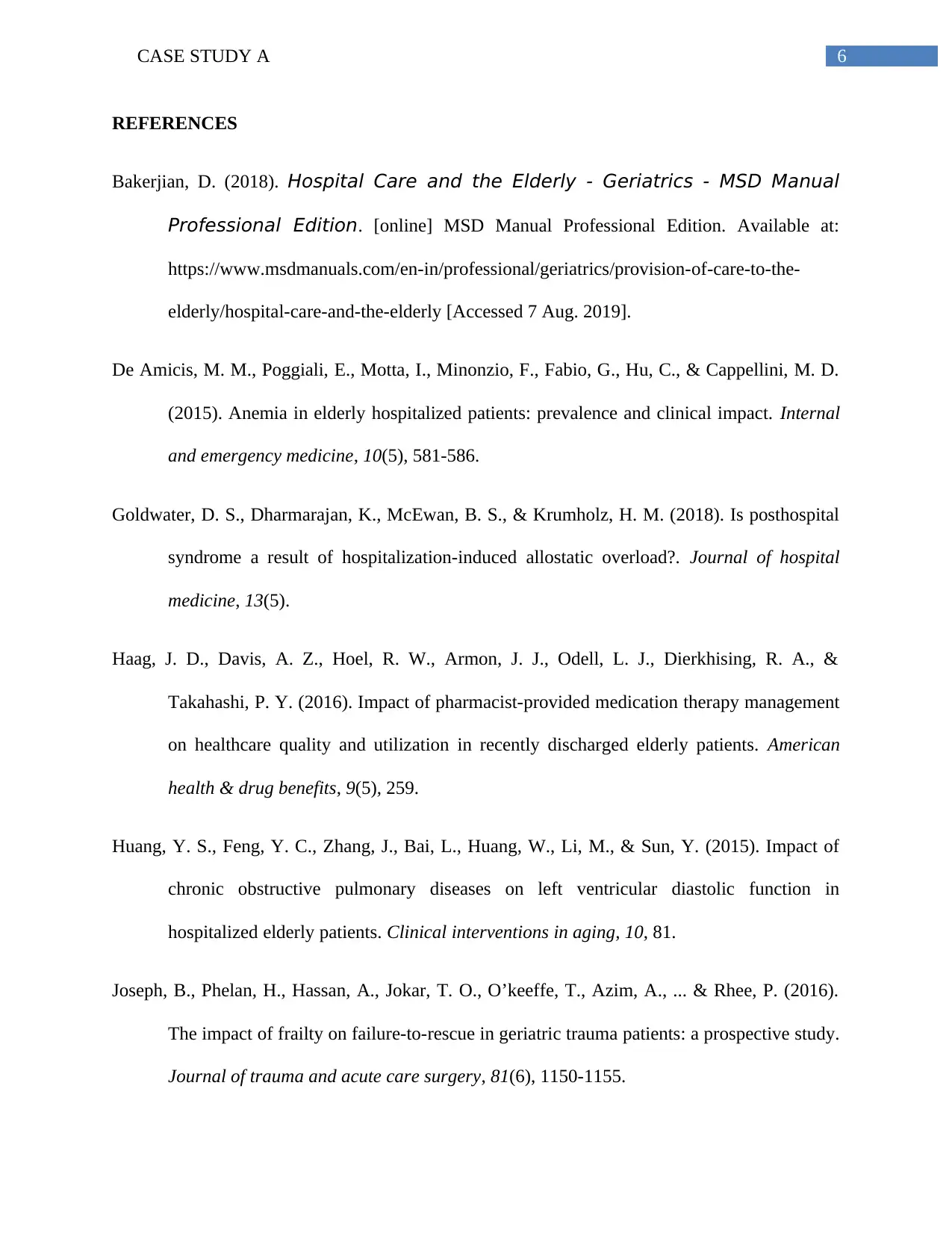
6CASE STUDY A
REFERENCES
Bakerjian, D. (2018). Hospital Care and the Elderly - Geriatrics - MSD Manual
Professional Edition. [online] MSD Manual Professional Edition. Available at:
https://www.msdmanuals.com/en-in/professional/geriatrics/provision-of-care-to-the-
elderly/hospital-care-and-the-elderly [Accessed 7 Aug. 2019].
De Amicis, M. M., Poggiali, E., Motta, I., Minonzio, F., Fabio, G., Hu, C., & Cappellini, M. D.
(2015). Anemia in elderly hospitalized patients: prevalence and clinical impact. Internal
and emergency medicine, 10(5), 581-586.
Goldwater, D. S., Dharmarajan, K., McEwan, B. S., & Krumholz, H. M. (2018). Is posthospital
syndrome a result of hospitalization-induced allostatic overload?. Journal of hospital
medicine, 13(5).
Haag, J. D., Davis, A. Z., Hoel, R. W., Armon, J. J., Odell, L. J., Dierkhising, R. A., &
Takahashi, P. Y. (2016). Impact of pharmacist-provided medication therapy management
on healthcare quality and utilization in recently discharged elderly patients. American
health & drug benefits, 9(5), 259.
Huang, Y. S., Feng, Y. C., Zhang, J., Bai, L., Huang, W., Li, M., & Sun, Y. (2015). Impact of
chronic obstructive pulmonary diseases on left ventricular diastolic function in
hospitalized elderly patients. Clinical interventions in aging, 10, 81.
Joseph, B., Phelan, H., Hassan, A., Jokar, T. O., O’keeffe, T., Azim, A., ... & Rhee, P. (2016).
The impact of frailty on failure-to-rescue in geriatric trauma patients: a prospective study.
Journal of trauma and acute care surgery, 81(6), 1150-1155.
REFERENCES
Bakerjian, D. (2018). Hospital Care and the Elderly - Geriatrics - MSD Manual
Professional Edition. [online] MSD Manual Professional Edition. Available at:
https://www.msdmanuals.com/en-in/professional/geriatrics/provision-of-care-to-the-
elderly/hospital-care-and-the-elderly [Accessed 7 Aug. 2019].
De Amicis, M. M., Poggiali, E., Motta, I., Minonzio, F., Fabio, G., Hu, C., & Cappellini, M. D.
(2015). Anemia in elderly hospitalized patients: prevalence and clinical impact. Internal
and emergency medicine, 10(5), 581-586.
Goldwater, D. S., Dharmarajan, K., McEwan, B. S., & Krumholz, H. M. (2018). Is posthospital
syndrome a result of hospitalization-induced allostatic overload?. Journal of hospital
medicine, 13(5).
Haag, J. D., Davis, A. Z., Hoel, R. W., Armon, J. J., Odell, L. J., Dierkhising, R. A., &
Takahashi, P. Y. (2016). Impact of pharmacist-provided medication therapy management
on healthcare quality and utilization in recently discharged elderly patients. American
health & drug benefits, 9(5), 259.
Huang, Y. S., Feng, Y. C., Zhang, J., Bai, L., Huang, W., Li, M., & Sun, Y. (2015). Impact of
chronic obstructive pulmonary diseases on left ventricular diastolic function in
hospitalized elderly patients. Clinical interventions in aging, 10, 81.
Joseph, B., Phelan, H., Hassan, A., Jokar, T. O., O’keeffe, T., Azim, A., ... & Rhee, P. (2016).
The impact of frailty on failure-to-rescue in geriatric trauma patients: a prospective study.
Journal of trauma and acute care surgery, 81(6), 1150-1155.
Paraphrase This Document
Need a fresh take? Get an instant paraphrase of this document with our AI Paraphraser
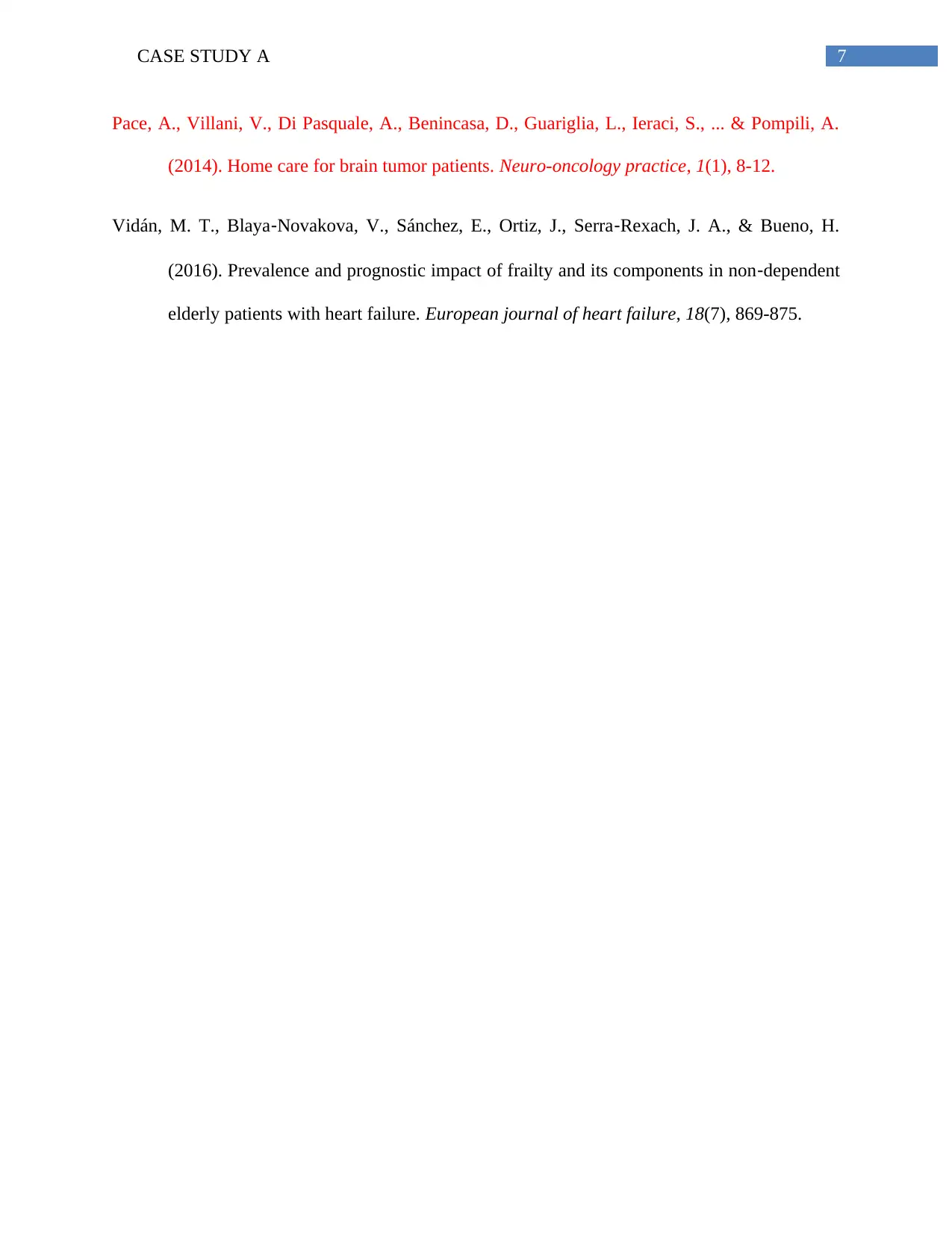
7CASE STUDY A
Pace, A., Villani, V., Di Pasquale, A., Benincasa, D., Guariglia, L., Ieraci, S., ... & Pompili, A.
(2014). Home care for brain tumor patients. Neuro-oncology practice, 1(1), 8-12.
Vidán, M. T., Blaya‐Novakova, V., Sánchez, E., Ortiz, J., Serra‐Rexach, J. A., & Bueno, H.
(2016). Prevalence and prognostic impact of frailty and its components in non‐dependent
elderly patients with heart failure. European journal of heart failure, 18(7), 869-875.
Pace, A., Villani, V., Di Pasquale, A., Benincasa, D., Guariglia, L., Ieraci, S., ... & Pompili, A.
(2014). Home care for brain tumor patients. Neuro-oncology practice, 1(1), 8-12.
Vidán, M. T., Blaya‐Novakova, V., Sánchez, E., Ortiz, J., Serra‐Rexach, J. A., & Bueno, H.
(2016). Prevalence and prognostic impact of frailty and its components in non‐dependent
elderly patients with heart failure. European journal of heart failure, 18(7), 869-875.
1 out of 8
Related Documents
Your All-in-One AI-Powered Toolkit for Academic Success.
+13062052269
info@desklib.com
Available 24*7 on WhatsApp / Email
![[object Object]](/_next/static/media/star-bottom.7253800d.svg)
Unlock your academic potential
Copyright © 2020–2026 A2Z Services. All Rights Reserved. Developed and managed by ZUCOL.





